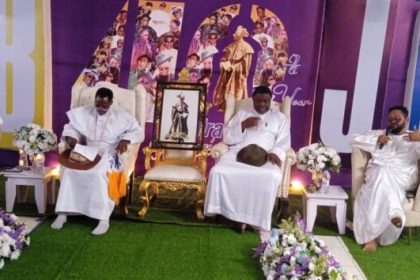Religious Freedom. It’s a value that was so important to the Founding Fathers that they dedicated the First Amendment to the Constitution to it. It’s a freedom, though, that many Americans tend to take for granted.


Each year, the United States Conference of Catholic Bishops sponsors Religious Freedom Week, to remind Americans of this precious value and to serve as a call to prayer, reflection and action. The week begins with the feast of the martyr Saints Thomas More and John Fischer, June 22, and concludes on June 29, the Solemnity of Saints Peter and Paul.
Each day of Religious Freedom Week is dedicated to a different topic, and this year, the US Bishops have included for special prayer two countries where religious freedom has been under strain: Nicaragua and Nigeria.
That couldn’t be more timely. Earlier this month, a Christian community in the Nigerian state of Benue suffered a deadly attack that is thought to have been perpetrated by Islamic jihadists. Some 200 Christians were killed in the attack. The Church in Nicaragua, meanwhile, continues to struggle with burdensome restrictions placed upon it by the government.
Nigeria
The day of prayer for Nigeria is June 29. On the website for the Religious Freedom Week, the bishops point out that the country has been plagued by “complicated and multifaceted dynamics of religious conflict, including competition for natural resources between Muslim Fulani herders and Christian farmers.”
Although Nigeria is half Christian and half Muslim, Sharia Law has been implemented in 12 of the 20 northern states, a move that the bishops say has “further marked the north-south divide that has been present in Nigeria since before independence from the British Empire in 1960.”


“Christians in states under Sharia Law are many times obligated to adhere to its tenets, and face much civil society discrimination, including the denial of public services and the imposition of Muslim religious garb,” the US bishops say. They quote Archbishop Matthew Man-Oso Ndagoso of Kaduna, who said that while he cannot build a church in the north of the country, the Government “employs and pays imams to teach in schools. Every year they have money to build mosques in the budget but will not let you build churches.” “Beyond the political dimension, radicalization of Fulani herders, as well as elements of Boko Haram—which persecutes both Christians and Muslims—has contributed an increase in anti-Christian violence,” the bishops say.
In its annual Activity Report, which was released June 18, ACN points out that the challenges facing the Church in Nigeria tend to strengthen people’s faith.
“The high number of priestly vocations is particularly encouraging,” says the report. In 2024, ACN therefore once again prioritized supporting the training of future priests and provided assistance to needy priests through Mass stipends.
“In view of the high number of severely traumatized victims of violence, ACN also promotes additional psychotherapeutic training for priests and religious sisters so that they can offer qualified help to those affected,” the report says.
Other ways ACN support the Church in Nigeria include helping the Church to rebuild destroyed buildings, aiding in implementing essential security measures, and offering food, hygiene products, medicines and materials for emergency shelters in an area that experienced severe flooding.
Nicaragua
The US bishops have set June 25 as a day of special prayer for the Church in Nicaragua, which they call “the one remaining independent civil society institution in the country since the abolition of all political opposition parties and organizations in the country in 2021.”
But, they continue, the Nicaraguan Church “continues to suffer persecution from the regime of Daniel Ortega and his wife and Co-President, Rosario Murillo.”


“Since 2018, when the Nicaraguan bishops declared their support for the Nicaraguan people’s right to protest against unpopular governmental fiscal policies, the Church in Nicaragua has suffered a systematic and politically charged campaign of aggression, including bloody assaults against parishes and chapels, kidnappings, politically calculated desecrations of the Blessed Sacrament, the expulsion of the Apostolic Nuncio, the exile of half of the country’s bishops, and many priests and religious,” the bishops point out. “Despite these tremendous challenges, the Nicaraguan people remain steadfast in their faith, and have, courageously, opted for the exercise of peaceful opposition to the unjust and against policies against the Church in Nicaragua.”
The political situation has made it difficult for ACN to fund projects in Nicaragua, but the pontifical foundation did help in the relocation of elderly and sick nuns belonging to the Company of Saint Teresa of Jesus to Costa Rica.
Other concerns that the bishops want to highlight in this year’s Religious Freedom Week include political polarization, IVF mandates, Catholic healthcare, parental choice in education, immigration services, and freedom to serve the common good.



